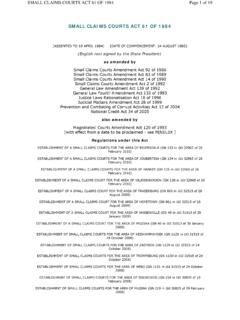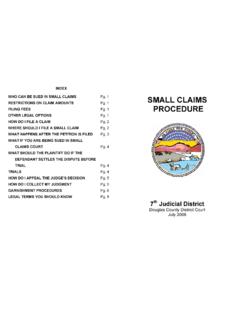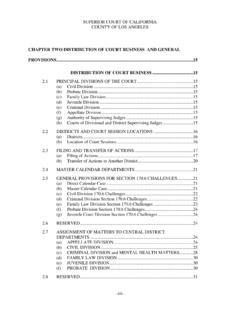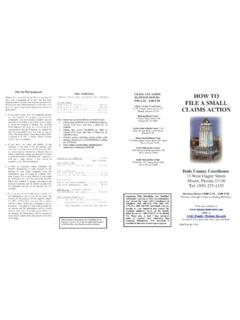Transcription of Small Claims Procedures FAQ - QCRPA
1 Small Claims Procedures . Frequently Asked Questions: Representing Yourself in court A. FILING A PETITION. 1. How do I bring a lawsuit? To commence a civil action, you must file a petition with the clerk of court . The petition should contain information about the case such as the names of the parties to the cases, the nature of the case or the cause of action and your request for a remedy or relief. You must also serve the petition on the opposing party (see question number 2). The date of filing shall determine whether an action has been commenced within the time allowed by statutes of limitation.
2 The time period differs depending on the type of action being undertaken. For example, actions for injury to a person or reputation of a person must be carried out within two years. Iowa Code Chapter 614 sets out the different time periods for bringing a lawsuit. However, other Code chapters could apply. In addition, the statute of limitations may be tolled of affected by certain circumstances. 2. How do I serve my petition on the opposing party? You must serve a notice, called an original notice, informing the defendant, respondent, or other party against who an action has been filed.
3 Rule of Civil Procedure 49 addresses the form of the notice and the Procedures for its issuance and service. In most cases, an original notice is served by delivering a copy to the proper person. There are various means of service set out in Iowa Rules of Civil Procedure through (scroll to page 45). The most common means is to contact a process service or the county sheriff to personally serve the party with the notice, but this is not appropriate in all cases. Consult an attorney to determine the proper means of service for your particular case. 3. In what county [or state] do I file my case?
4 The answer to this question depends on the type of case that is being filed, where the litigants live, and where the events that are the subject of the lawsuit took place. Typically, if you live in County A, the defendant lives in County A, and the event that is the subject of the lawsuit occurred in County A, you need to file the petition in County A.. B. ANSWERING A PETITION. 1. How do I file an answer? An answer is a defendant's response to documents filed in court . An answer should be in writing (preferably typed) and filed with the clerk of court within 20 days after the petition was served on the party.
5 (For information on calculating deadlines, see Iowa Code section (34).) The litigant must provide a copy to the opposing party. There are various means of service set forth in Rule of Civil Procedure (scroll to page 52). The answer includes a response to each specific allegation or paragraph in the petition or pleading to which the defendant is responding. See Rule of Civil Procedure (scroll to page 48). The answer should also incorporate any affirmative defenses. 2. A petition was filed on me more than 20 days ago. Can I still file an answer? Yes, the clerk of court must accept an answer at any time, even if it is late.
6 But the clerk cannot speculate about the legal consequences of filing the answer late. A judge will determine the outcome. If you miss the time for filing your answer, the opposing party may request that the court enter a default judgment against you. (See Rules of Civil Procedure through (scroll to page77).). The court may set aside a default judgment only for good cause shown for mistake, inadvertence, surprise, excusable neglect and unavoidable casualty. The party seeking to have the court set aside the default must submit the request in writing as soon as possible after discovering the problem but within sixty days after entry of the judgment.
7 (See Rules of Civil Procedure (scroll to page 78).). ----- C. Small Claims . 1. What constitutes a Small Claims case? A Small Claims case is a civil action for a money judgment in which the amount in controversy is $5000 or less. Under certain circumstances, an action for forcible entry and detainer (typically arising out of a landlord tenant dispute) can be brought in Small Claims court . 2. How is Small Claims court different from other civil actions? Small Claims court was created to provide citizens with a simplified process for resolving civil disputes. In Small Claims court , cases are tried before a judge, not a jury, without strict regard to technicalities of procedure.
8 Small Claims procedure is less complicated than other court Procedures and the court provides simplified standard forms. In addition, the filing fee is lower ($50 for Small Claims vs. $100 for regular civil cases). 3. Is there a court hearing? Yes. If the other party has entered a timely answer or defaulted (not answered), the clerk shall assign a case to the calendar for hearing. The clerk shall transmit the case file to the judge assigned to hear the case. A magistrate, district associate judge, or district court judge may hear the case. Judicial magistrates hear most Small Claims cases.
9 These hearings are not recorded by a certified court reporter unless the party provides the reporter at the party's own expense. At the magistrate's discretion the hearing may be electronically recorded. 4. Do I need a lawyer for a Small Claims case? Some litigants in Small Claims court choose to have a lawyer, though it is not required. If the case involves a Small amount of money, or the evidence strongly favors one side over the other, it is not necessary. There are a few halfway points you can choose rather than paying to hire a lawyer: Do research on relevant legal issues at a law library (Drake, University of Iowa, or the State of Iowa Library at the Iowa Capitol).
10 Pay a lawyer for an hour or so to look over your case and point out strong and weak points. 5. How do I bring a Small Claims action? Begin by going to the clerk of court office in your local courthouse. The clerk can furnish you with a standard form to use as a pleading or petition which, when complete, sets forth your cause of action against the other party. You must complete the form. The clerk may provide information to help you to complete the form. However, the clerk cannot provide you with legal advice. When the pleading is complete, it must be served on the other party. Once you have paid the clerk for the cost of service, the clerk will cause service to be obtained.







